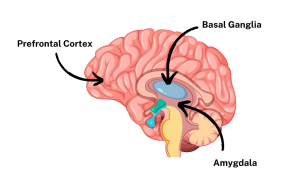Substance Use
What is Substance Misuse versus Substance Use Disorder?
When talking about substance use it is important to understand the difference between substance misuse and substance use disorder (SUD). According to Mehr et al., the difference is as follows:1
- Substance misuse: using substances at “high doses or in inappropriate situations”
- Substance use disorder: “a diagnosable illness that arises following prolonged substance misuse and that significantly alters health and daily functioning”
Substances may include alcohol, tobacco, recreational drugs, prescription opioids, inhalants, sedatives, or stimulants.1-3
Research indicates higher rates of SUD for those who have experienced intimate partner violence. This may be due to use of substances as a coping mechanism for the abuse they have experienced.1-2
Signs and Symptoms of Substance Use Disorder
According to the American Psychiatric Association, there are four main categories of symptoms associated with SUD. Click on the chart below to learn more about these signs and symptoms.3
Impact on Health
Prolonged use of substances can result in changes to the brain. These include physical changes to the brain itself and how the brain operates. The three areas of the brain that can be affected include the basal ganglia, amygdala, and prefrontal cortex.4
- Basal ganglia: responsible for rewards and habits
- Amygdala: responsible for emotions
- Prefrontal cortex: responsible for thinking

Ultimately these changes in the brain result in difficulties with judgement, decision-making, learning, memory, behavior, thinking, and personality.3 Click on the icons below to view the relationship between different areas of the brain and the cycle of substance use.4
Historically there has been stigma around substance use and a misconception of “why doesn’t someone just stop?”. As you can see substance use is far more complex than that. Substance use changes the brain structure and function making it more difficult to stop on your own.
Seeking Medical Help
If you are struggling with a substance use disorder it is important to seek medical help. A healthcare provider will be able to provide you with the most well-rounded treatment approach to meet your individual needs. When speaking with a healthcare provider you may find it helpful to organize your thoughts prior to your appointment. Click here for a worksheet to organize your concerns. Questions to consider as you fill out this form:
- What symptoms have you been experiencing?
- How are these symptoms impacting your life?
- How long have you experienced these symptoms?
- What other medical conditions have you been diagnosed with that would be important to inform this provider?
If you are looking to get connected with supportive services in your area dial 211. This nationwide service connects you with supports including basic human needs, physical and mental health resources, and so much more. Other resources:
- Substance Abuse and Addiction Hotline: 1-844-289-0879
- Suicide and Crisis Hotline: 988
Key Takeaways
- Survivors of domestic violence may experience higher occurrences of substance use disorder.
- Symptoms of substance use disorder include difficulties with controlling use of the substance, trouble completing daily activities, disregard to safety, increased tolerance, and withdrawal symptoms.
- Substance use disorder can affect physical structures of the brain and how the brain operates.
- It is important to seek medical help if you believe you may be affected by substance use disorder.
